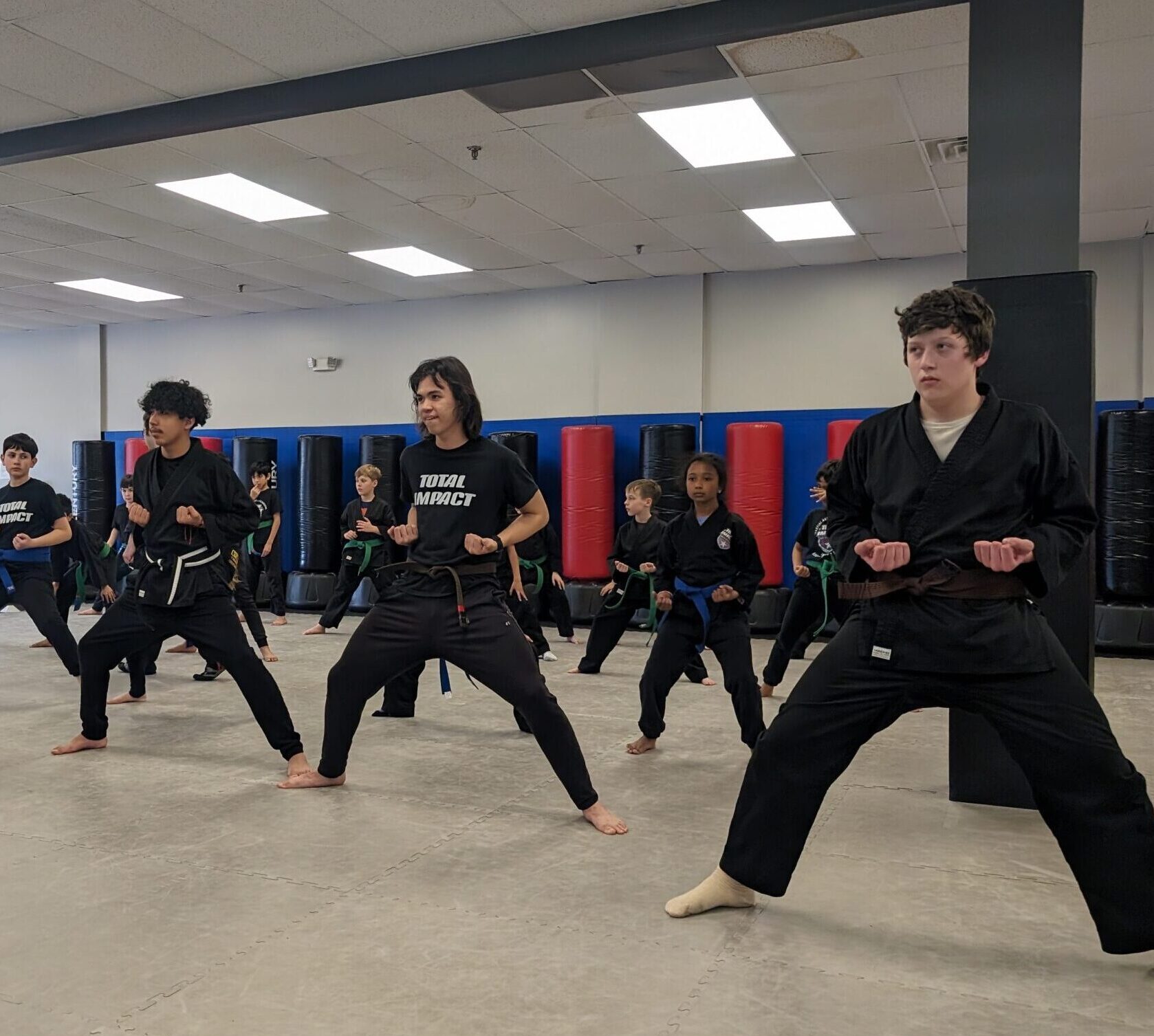At Total Impact Martial Arts, we recognize by midyear how quickly the excitement of a new school year can wear off. Students reach what teachers refer to as the “mid-year slump,” feeling exhausted, bored, or overwhelmed. All of a sudden, routines become routine, homework is mounting, and even the best students can start to lose steam. You may even be Googling Mid-Year School Motivation Tips at this very moment, searching for how to reignite your child’s love for learning. The great news? Martial arts may be the ideal solution.
Physical exercise is also excellent for the brain. Active kids who engage in physical activities at school perform better on exams. For instance, Kansas researchers discovered that kids in dynamic classroom lessons boosted their grades by about 6% in three years, while students in regular classes actually dropped behind. More compelling, newer studies indicate that kids enrolled in martial arts classes possess a more focused attention and better school grades than children who participate only in team sports or no sports at all. In other words, martial arts for school performance is backed by science.
Teachers report that this dip occurs because the freshness of the year has dissipated. Adaptive problems include:
- Low motivation: By January, many kids feel burned out and struggle to tackle the same old lessons.
- Academic stress: Tough projects and exams pile up, leaving students anxious or overwhelmed.
- Screen-time overload: More indoor time often means more video games and social media, which can hurt sleep and focus.
- Social pressures: Navigating friendships, peer pressure, and anxiety can feel even harder as the year drags on.
These difficulties can drain a child’s energy, and every day can feel like a marathon. But martial arts training can specifically solve all of these problems, with active, working solutions tailored to engage and benefit every student.
Renewing Motivation & Focus
Martial arts classes are goal-oriented and action-filled, just what students need when school becomes mundane. In our dojo, children train for definite goals (such as achieving a new belt or completing a technique), having small victories every few weeks. Rather than waiting for the clock to strike in class, they’re learning kicks, forms, and sparring – and loving it. That renewed enthusiasm translates to homework and tests. For instance, a child who can learn to concentrate on an instructor’s commands is able to do better in concentrating on their math or science teacher’s lesson.
Handling Academic Stress & Time Management
Heavy homework and major exams usually come during midyear. Disciplines and habits are what martial arts teach – the same skills that tame school stress. In school, students adhere to scripted routines and are taught to listen even when they are tired. That discipline lasts: a karate student learns to remain still, establish goals, and keep practicing until he is better. After class, those habits translate to homework. Managing a martial arts routine (classes, practice, rest) requires children to manage their time well, the same method they use to juggle homework, activities, and relaxation at home.
Boosting Confidence & Resilience
It’s natural for children to lose confidence when things go wrong. Martial arts gives them an immediate confidence boost. Each new skill mastered and each belt attained indicates to students that it pays to work hard. In our classes, instructors and peers applaud each triumph, from mastering a punch to winning a friendly sparring match, as they build confidence step by step. Studies confirm: young martial artists exhibit substantially more self-confidence and social competence than their peers. At Total Impact, we watch it every day: a shy child can transform into a class leader, showing themselves that they can master things.
Beating Screen Time and Building Fitness
By January, most children resort to screens by default. Martial arts provides a much more stimulating option. Practicing karate or kickboxing is an adventure. On the mats, children jump, dodge, and learn real skills. There is no video game to compare to the rush of executing a flawless kick or learning a new style. Being active in this manner also assists children with better sleep and enhanced alertness at school. Rather than staring blankly at the TV, kids put their energy to use training and frequently find being active as much enjoyment as playing games.
Social Skills & Teamwork
School becomes stressful if the child experiences difficulties socially. At martial arts class, students feel an immediate sense of community. Our dojos are centered on respect, support, and cooperation. Each student bows upon arrival, and we drill continually on assisting one another to get better. Drilling up against each other to master techniques instills listening and cooperation, and friends high-five and support one another. This safe support environment quickly brings reserved or nervous children out of their shells. It is no surprise that kids create friendships that last a lifetime in martial arts, and that positivity follows them into the classroom.
Embracing Challenges & Grit
By mid-year, all children have encountered frustration. It might be a difficult math problem or a challenging new kata, but either way, martial arts instills a good reaction to failure: perseverance. In class, students practice falling safely and rising, and practicing kicks and punches until they get it right. Every belt test or sparring session teaches them that failures simply mean “try again.” This is a growth mindset – also referred to as grit – constructed one little win at a time on the mats. When adversity strikes in school, martial-arts children learn to remain calm and continue to try and try until they get it right.
By the end of the school year, martial arts will have given your child much more than a black belt. You’ll see better focus, discipline, and attitude in their schoolwork, not to mention improved fitness and confidence. Parents often report better grades, stronger behavior, and even new leadership skills in their martial-arts kids. So if you’ve ever wondered how martial arts benefits children at school, rest assured that it’s been shown to improve focus, decrease stress, and establish good habits.
In summary, martial arts helps your child by building key life skills:
- Focus & Concentration: Martial arts training requires attention to detail and sustained focus. In fact, studies show kids in active classes had about a 6% boost in test scores.
- Goal-Setting & Perseverance: Kids learn to set personal goals and work step by step to achieve them, whether mastering a new move or tackling a tough project.
- Confidence & Resilience: Overcoming challenges in class proves to kids that they can succeed with effort, boosting self-esteem.
- Discipline & Responsibility: Learning routines and earning belts teaches time-management, commitment, and accountability.
- Stress Relief: Physical activity provides a healthy outlet for frustration and pent-up energy.
- Social Skills & Teamwork: Partner drills and group exercises help kids communicate, cooperate, and make friends.
These tools empower kids throughout the school year and beyond.
Let’s Get Started
Ready to assist your child in taking over the remainder of the school year? Call Total Impact Martial Arts today and see how our classes can make a difference. Whatever they need – motivation, stress relief, or simply a new fun challenge – our classes have the skills to propel them forward with confidence and concentration. Book a free trial class today – we can’t wait to see your child succeed in martial arts!


